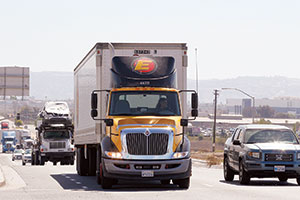Carriers Cautious on Freight Market

MIAMI — Privately held trucking companies are approaching today’s freight market with a healthy dose of caution, prompted by factors such as high inventories and weaker exports, according to top carrier officials addressing an investor conference.
Marc Rogers, CEO of truckload fleet Interstate Distributor Co., described the current market as “really flat” and said his company is hoping to see “a bit more of an uptick,” particularly in March, the busiest shipping month of the quarter.
He joined other executives at the Stifel Transportation and Logistics Conference here Feb. 9.
“We have to think about playing defense again,” said Vince McLoughlin, chairman of dedicated carrier Cardinal Logistics Management Corp., which ranks No. No. 22 on the Transport Topics Top 50 list of the largest logistics companies in North America. He outlined the consequences of a weakening freight market: “Last year was fun. We were able to grow. After a decade in the doldrums, we were able to have a few good quarters.”
A&R Logistics Inc. CEO Mark Holden, whose company specializes in energy and chemical markets and ranks No. 95 on the Transport Topics Top 100 list of the largest U.S. and Canadian for-hire carriers, said, “We have not had a very attractive environment in the last several quarters. Inventories are still pretty much bloated. We don’t see any near-term catalysts.”
The drop-off in exports as the dollar strengthened hit hard at No. 68 Evans Network of Cos., CEO Bo Bates said. The drayage specialist achieved a 15% growth pace in the first half of last year, until global markets shifted and pushed growth down to a few percentage points year-over-year.
“Nothing has changed for the better,” said Bates, who cited growing rate pressure from ocean carriers that are key customers, though he added that the pricing issues could be only in the short term.
One carrier, less-than-truckload specialist A. Duie Pyle Inc., ranked No. 75, had a brighter view of the market but the reason wasn’t the economy, CEO Peter Latta said. It was because business shifted to his company after competitor Land Air Express of New England was shut down for more than a week by the Federal Motor Carrier Safety Administration due to safety issues. Land Air Express of New England is operating again.
Carriers also were in agreement that there has been a temporary easing of a chronic driver shortage as well as a unanimous expectation that newly adopted and future federal regulations, such as electronic logging devices, will have a far-reaching effect.
“The driver shortage is still really hard,” McLoughlin said, “but it is easing off a little bit.”
Billy Hupp, chief operating officer of No. 15 Estes Express Lines, said, “We have been able to grow our driver fleet. We actually lowered our driver age over the last couple of years,” despite the demographics of aging drivers for the industry as a whole.
“This is just a temporary lull,” he added. “It will definitely become more difficult.”
The catalyst for that, several speakers noted, will be the advent of federal mandates.
For example, Rogers maintained that there are good and bad factors in the looming regulations: ELDs are going to be positive by “leveling the playing field and getting rid of bad actors” who flout hours-of-service rules. However, he said, there is a “very concerning” problem with the uneven enforcement of the Compliance, Safety, Accountability program, which penalizes safe carriers in states where enforcement is particularly zealous.
McLoughlin said he welcomed tightening of safety regulations, while remarking that making changes in trucking regulations can be painful.
“Trying to change [the regulatory process] in Washington is as difficult as watching the Kardashian sisters on television,” he joked.
A&R’s Holden said adopting ELDs at his company led to a 5% to 7% drop in productivity but also a 70% improvement in safety scores.
All of the speakers also had similar views on the growing trend at freight companies to add a broader range of services, such as brokerage.
Hupp said Estes will add services in response to customer demand, but those services have to enhance the main less-than-truckload business. Estes has added services such as forwarding and dedicated operations.
Latta agreed, saying customer demand prompted the addition of integrated services such as dedicated and brokerage operations.
Bates said his company is hoping to expand the drayage model into other trucking areas as long as it is consistent with Evans’ independent contractor model.




